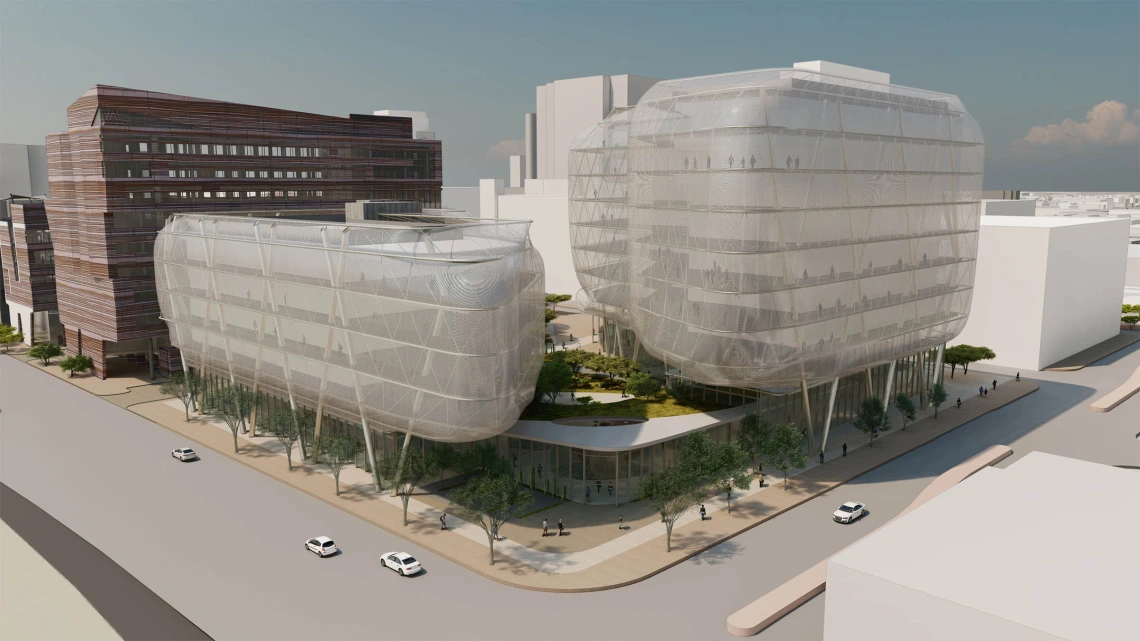New Immunotherapy Center Coming to Phoenix Bioscience Core
The Center for Advanced Molecular and Immunological Therapies will be a hub for precision medicine research, innovation and education in Phoenix.

A rendering of the proposed Center for Advanced Molecular and Immunological Therapies building on the Phoenix Bioscience Core, looking at the Bioscience Partnership Building on the left. The view is from the intersection of 7th St. and Fillmore.
Researchers and physician-scientists are increasingly using precision medicine to develop new cell- and gene-based therapeutical options for diseases, building on the idea that the most effective defense against health issues is the body’s natural immune system.
The Center for Advanced Molecular and Immunological Therapies, or CAMI, is a new Phoenix-based University of Arizona Health Sciences center that will have four areas of research focus: cancer, infectious diseases, autoimmune diseases and real-time immune system monitoring. CAMI also will serve as the anchor for an innovation district that will establish the Phoenix Bioscience Core as a center of research, startup activity and corporate engagement.
“Our expertise in basic science, translational medicine and investigator-initiated clinical trials will allow UArizona Health Sciences to lead the nation in advanced immunotherapies research,” said Michael D. Dake, MD, senior vice president for UArizona Health Sciences. “We believe the Phoenix Bioscience Core is the perfect location to allow us to bring together world-class faculty, clinical researchers and internationally recognized thought leaders to catalyze the next generation of precision health care treatments.”
Using New Economy Initiative funding provided to the University of Arizona and allocated to UArizona Health Sciences, CAMI is being developed under the guidance of a 17-member advisory council of leaders from academic research, biomedical and health care industries, government and corporations across the state. Deepta Bhattacharya, PhD, professor of immunobiology in the UArizona College of Medicine – Tucson and member of the BIO5 Institute, chairs the Leadership and Organization committee.
“The goal of our committee is to identify and recruit a visionary leader for CAMI. Immunology intersects with almost all aspects of health and disease, thereby presenting almost limitless possible directions for our new center,” Dr. Bhattacharya said. “The right leader will be able to bring creative vision and focus to maximize fundamental discoveries in immunology and the development of new therapies based upon this knowledge. We have a real opportunity to make a unique impact in areas of immunology and medicine that remain understudied. The first step is to find a leader who can get us there.”
Phoenix location builds statewide ties
The center’s location in Phoenix is expected to facilitate strong connections with partners such as Arizona State University, Northern Arizona University, the Mayo Clinic and the Translational Genomics Research Institute (TGen), while boosting the local economy in the process.
The research will take place in connected buildings that are being designed to include laboratories to support translational research, clinical research space and startup incubator space to create a synergistic environment for commercialization opportunities. Student education will be prioritized in learning spaces dedicated to academic programs that will allow CAMI faculty and researchers to mentor and train of the next generation of scientists.
“Our space committee is hard at work discussing how CAMI will transform the physical and scientific landscape in Phoenix,” said space, design and construction committee chair Ken Knox, MD, associate dean of faculty affairs and professor of internal medicine in the College of Medicine – Phoenix. “As the building will be several stories high and architecturally unique, it will certainly catch your eye as you drive up and down 7th Street. The work of this committee is extremely important, as innovative research programs will be housed in CAMI that will require highly specialized research and laboratory space. We will ensure CAMI is a destination for high-impact research and the community.”
CAMI is mainly a university-centric initiative, but all collaborating institutions across the state will benefit on several fronts, including recruitment, corporate partnering, sponsored research and experiential learning. The benefits extend to creating a sense of place, where university research, entrepreneurial activity, corporate support and community inclusion intersect.
Successful life sciences innovation centers have demonstrated significant positive financial impact in terms of launching new companies, attracting new strategic corporate operations, creating jobs in a rapidly expanding economic sector, and enhancing educational opportunities – all of which benefit local municipalities and state governments.
Photo Gallery: Future Health Sciences Center Buildings, Site Key to Success

